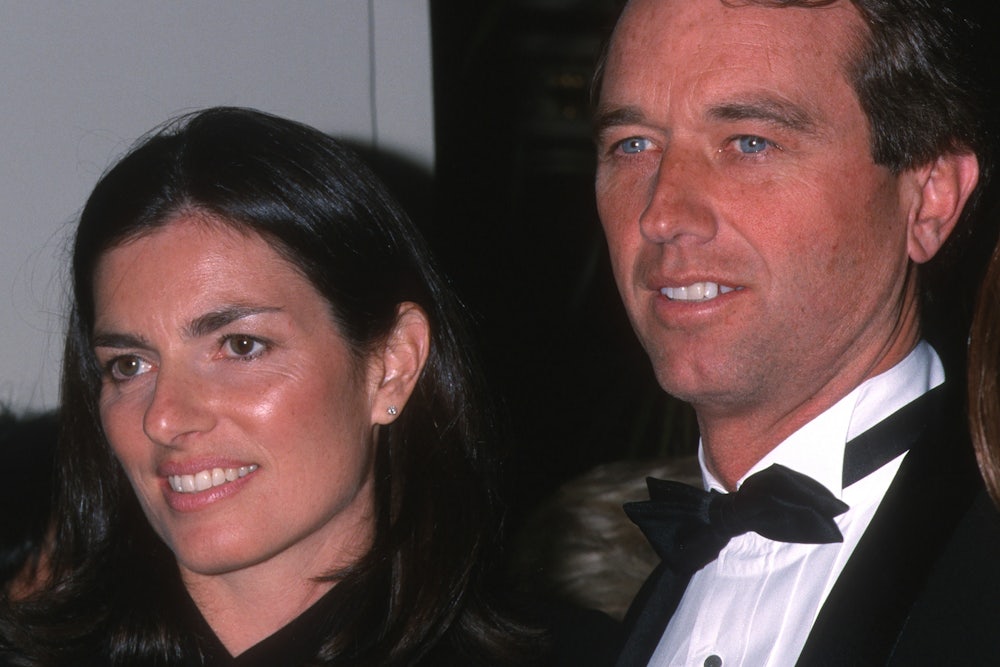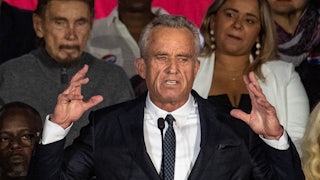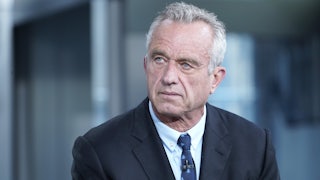Europeans can no longer snicker about the American puritanical streak, the old litmus test for our politicians. Bill Clinton had an affair, and while Republicans were convulsed, America, after the initial shock, basically yawned. But then came Donald Trump, who proved the point conclusively. Billy Bush’s hot mic and the election of the pussy-grabber to the presidency exploded the myth. Today, even a guilty verdict in a sexual assault case doesn’t deny a man the leadership of one of the two political parties.
And this year, we have new proof that puritanism is dead. Coverage of Robert F. Kennedy Jr.’s candidacy suggests that problematic behavior with women as an electability issue is apparently a thing of the past for American men running for office.
No reporter has yet asked the candidate or his campaign about stories of rampant womanizing, behavior that some believed contributed to his troubled wife Mary’s 2012 suicide. “Mary was a fabulous mother and, like all of us, a flawed adult whose problems stemmed from her husband’s conduct and her drinking, caused by specific stimuli, with Bobby—who could anger, frustrate, belittle her into taking a drink—as provocateur,” her divorce lawyer told The Daily Beast in 2017.
Feminist writers, such as the terrific political journalists Rebecca Traister and Michelle Goldberg, have written extensively about Bobby Junior but not about his history with women. (Traister mentioned the issue in one sentence in a New York magazine cover article.) Even The New York Times, winner of a well-earned Pulitzer for the #MeToo Harvey Weinstein takedown, produced a story about Kennedy’s current wife, beloved Larry David co-star Cheryl Hines, apparently without asking about the elephant in the room. The Times published a standard-issue political wife article with no mention of the sordid side. “And it seems clear he will need Ms. Hines,” the Times wrote, “who is in the unique position of being more recognizable to some voters than her candidate husband, to help soften his image for those put off by his crusade against vaccines and history of promoting conspiracy theories, such as the false narrative that Bill Gates champions vaccines for financial gain.”
While her husband raves about the United States pushing “the Ukraine” into war, Hines has always stayed on message. “We share the same values. Family first,” she told the New York Post before they got married.
The Post matters here. The Murdoch paper is the chief source on details of the womanizing, and journalists tend to steer away from its reporting unless verified elsewhere. Occasionally, though, it produces actual tough journalism, and it did so shortly after Mary Kennedy died, when a friend of hers gave the tabloid two diaries, dated 2001, kept by Bobby.
The documents—which neither Kennedy nor his lawyer ever denied were his—total 398 pages, each with a “ledger” in the back, on which he listed 37 women by first name only and ranked them with numbers one through 10. Like a kid in high school, Kennedy used the numbers to represent “how far” they had gone toward sexual intercourse. One entry logged three women in a day.
A source who has seen the diaries said: “What was interesting was that he portrays himself as a victim in all of the encounters with women. He was ogling after women in the environmental movement.”
He blamed the women, calling the sex acts “muggings.” In one entry, he recorded he “narrowly escaped being mugged” by a team of two women. “It was tempting but I prayed and God gave me the strength to say no,” he wrote. In a May 21, 2001, entry, according to the Post, he wrote that he “got mugged on my way home” from Manhattan and included the name of a woman with a 10 next to it.
The diaries served as a kind of confessional for the Catholic scion, heir to the family sex-addiction gene. “My greatest defect,” he wrote, was “my lust demons.” He had decided to “avoid the company of women. You have not the strength to resist their charms.”
Kennedy spent a month in prison in Puerto Rico (after an arrest for trespassing on American military grounds in a protest against Navy bomb exercises). He consoled himself by recording that being locked up prevented further womanizing. “I’m so content here,” he wrote in a July 2001 diary entry quoted in the Post. “I have to say it. There’s no women. I’m happy! Everybody here seems happy. It’s not misogyny. It’s the opposite! I love them too much.”
His campaign did not reply to a request for comment.
Besides the diary, Mary Kennedy also shared her husband’s phone contacts with the same friend, with the names of 43 women stored under the letter “G,” which his late wife believed stood for Goomah, an Italian idiom for mistress. The women were far-flung. Paris, Miami, Toronto, Aspen, Montreal, Cleveland, and Pensacola.
Junior was a tragic, fatherless 14-year-old pallbearer at his father’s funeral in 1968. He succumbed to a heroin addiction, which he conquered, to graduate into libertine adulthood occupying himself with boating, falconry, playing capture the flag on sweeping lawns, and women.
Now entering American politics with a storied name at a critical moment, with the nation desperate for responsible leaders, he says whatever the hell comes to mind, from suggesting Covid-19 was ethnically targeted to spare the Chinese and Jews to praising Putin, to promoting medically unsound advice and conspiracy theories about vaccines.
RFK Jr. doesn’t appear to have inherited the political savvy of his father or uncles, but he does carry a common trait with respect to women. Bobby Jr. was the third of Robert F. Kennedy’s children. His father was known as the most straitlaced of the Kennedy men, but even he found time to stray from Ethel, with whom he had 11 children. He burned through lovers, including actresses Kim Novak, Lee Remick, and most famously Marilyn Monroe.
Uncle Jack—JFK—was what psychology might today call a sex addict. White House aides shuttled interns, movie stars, and Washington socialites in the White House front door and out the back in time for the next one. His lovers included an East German spy, a mob girlfriend named Judith Campbell Exner, Mary Pinchot Meyer (about whom I wrote a book), a plethora of interns, friends of his wife, and, yes, Monroe.
In RFK Jr.’s own generation, cousin Michael Skakel served more than 11 years in state prison after he was convicted of the murder of Martha Moxley in 2002. She was 15 and had been flirting with his older brother the night she was bludgeoned and stabbed to death with a broken golf club. Skakel, freed on an appeal in 2013, used as his alibi that he was peeping in windows and masturbating at the time of the murder.
Months before his cousin was released, Bobby Jr. wrote an article for The Atlantic proclaiming Skakel’s innocence. Under the headline, “A Miscarriage of Justice,” he blamed an “inflamed media” and suggested his cousin’s tutor was a more likely suspect.
RFK Jr. never mentions his own womanizing in his 2018 memoir, American Values: Lessons I Learned From My Family. The sad disaster of his first marriage doesn’t get much ink either.
Mary Richardson was a brunette beauty who bore him four children, then fell apart over his philandering, exacerbated by depression and drinking. They were still married but living apart in May 2012, and he was already dating Cheryl Hines when Mary hanged herself in a barn on her property in Bedford, New York.
RFK Jr. was first on the suicide scene after a housekeeper, despite a court order in the pending divorce case declaring the property hers, not his. This is relevant because he was legally not the owner of the property when he oversaw the police removal of her laptop and phone. Mary’s family hired a private investigator, but they never saw her electronics again nor a suicide note.
Her family also objected to burying her at the Kennedy cemetery in Hyannis Port at the Kennedy compound. They wanted her buried in New York, but Bobby prevailed. A few weeks after the burial, he had her body disinterred and moved to a different corner of the cemetery. He said he wanted her body in a newer part of the graveyard, but like Trump’s burial of Ivana on his golf course, the episode has sparked wild theories.
“It’s another shady Kennedy mystery,” said a source who has seen the diaries. “It could be just as he said; he wanted her to be closer to a nice hill. People in Westchester are still shaking their heads about that.”
Actor Billy Baldwin, a friend of Mary’s, unleashed a Twitter rant at RFK Jr. in April, when he announced his candidacy. “If Bobby were half a man,” Baldwin wrote, “she would still be alive today. It will all come out. His campaign will be over in weeks. If these walls could talk.”
So far they haven’t. Or rather, they have, but no one seems to care. There are a few reasons why the media hasn’t paid much attention to the womanizing. First is the scion’s spew of bizarre positions and wacky statements, so Trumpian it constitutes a form of the Steve Bannon “flood the zone with shit” strategy. Who cares about his private life when the man is comparing vaccine cards to regulations in Nazi Germany, calling the Covid vaccine “the deadliest vaccine ever made,” blaming “chemicals in water” for gender dysphoria, loving on Putin, and promoting the popular theory that the CIA killed his uncle JFK?
The second reason for ignoring the alleged womanizing is the blasted, world-weary landscape with respect to candidates and women. In JFK’s time, of course, no journalist in Washington would have reported on a candidate’s sex life, even one as notorious as President Kennedy. That omerta had evaporated by the 1980s, with Gary Hart’s Monkey Business, followed by Bill Clinton’s Gennifer Flowers, Monica Lewinsky and the blue dress, and finally, the pussy-grabber’s election and his subsequent conviction in a civil sexual assault case. After the Borgian levels of depravity, the Weinstein and Jeffrey Epstein cases revealed—Leon Black facing three rape accusations (which he denies), Jes Staley and Bill Gates humiliated, etc.—half the country is blasé and the other half takes on faith that powerful men rape and eat infants.
Last but probably not least, many journalists distrust the New York Post. But the reporter who acquired the diaries and other material, Isabel Vincent, is a serious investigative journalist who covered the Medellín cartel as South America bureau chief for Canada’s Globe and Mail. She is the author of seven nonfiction books, one on the trafficking of early twentieth-century Jewish women that won the National Jewish Book Award, and another on Hitler and Swiss bankers that won the Yad Vashem Holocaust History Award.
The diaries are old, and so is the man who wrote them: Who knows, it’s possible that Bobby Junior is a reformed man. But any other man at any other time would certainly be asked about this past. And so should he.






